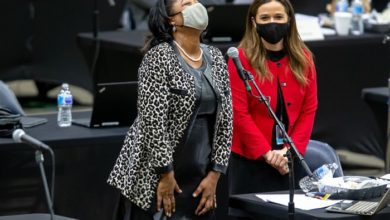Republicans introduce Fund the Police Act

Five Illinois Republicans introduced a legislative package this week to empower law enforcement.
State Senator Chapin Rose, who held a press conference Wednesday said that the measure was to curb recent violent acts in Illinois communities.
State Senators John Curran (R-Downers Grove), Jil Tracy (R-Quincy), Steve McClure (R-Springfield), and Brian Stewart (R-Freeport) also supported the measure.
“Downstate communities, including Champaign and Decatur, are experiencing unprecedented levels of violent crime,” Rose said in a press release. “The ‘Fund the Police Act’ will put resources where they are needed most: getting more boots on the ground to fight violent crime, funding police training, incentivizing the hiring and retention of police officers, helping to offset local governments’ police overtime costs, and helping to tackle mental health issues, which contribute to the overall problem.”
Included in the package are:
Fund the Police Act
- SB 2918 : Creates Fund the Police Grant Fund with $100,000,000 with appropriations to the ILETSB to make grants to local governments and universities to hire police officers, purchasing equipment designed to prevent gang violence, motor vehicle theft, carjacking, or sale of contraband, and training for law enforcement in preventing gang violence, motor vehicle theft, carjacking, or the sale of contraband. This includes mental health, hiring and retention incentives, and overtime.
Eliminate Good Time for Weapons Offenses and Attacks on Law Enforcement Officers
- SB 2916: Requires a defendant who commits Aggravated Battery to a Police Officer to serve at least 85 percent of their sentence.
- SB 2917 : Requires a defendant who brings a weapon or contraband into a penal institution serve at least 85 percent of their sentence.
Ending Deadly Delay
- SB 2927 : Requires Illinois Criminal Justice Information Authority to track gun crimes by convicted felons. Amended to include real time reporting by county of gun offenses charged and outcome of the case.
- SB 2926: Requires State’s Attorneys to provide written justification when a weapons offense is plea bargained down to a lesser offense or non-weapons offense. Similarly, in imposing a sentence, the judge shall set forth in a written sentencing order his/her reasons for imposing the sentence or accepting the plea agreement.
- SB 2924 : Allows a school or school district to employ qualified retired law enforcement officers to carry out the duties of a school resource officer.
Getting Serious on Gun Crime:
- SB 2928: First time conviction of the following offenses receives a mandatory 10 year sentence, second offense receives life sentence.
- Aggravated Discharge of a Firearm.
- Use of a stolen or illegally acquired firearm in the commission of an offense.
- Unlawful use or possession of weapons by felons.
- Armed Habitual Criminal.
- SB 2925: Mandatory minimum penalty for Gun trafficking/Straw purchases. Imposes a 10-year minimum on those who sell or give a firearm to a convicted felon.
Juvenile Court Reforms:
- SB 2929: Juvenile commitment to the Department of Juvenile Justice for use or discharge of a firearm in a school that results in bodily injury or death to any person.
- SB 2923 : Restore offenses of aggravated vehicular hijacking and armed robbery committed by juveniles with a firearm to the automatic transfer provisions of adult court.
- SB 2922: Prevent “catch and release” of juvenile carjackers by requiring a shelter care hearing to determine if it is safe to release the juvenile or continue holding until the adjudicatory hearing.
Bail Reform:
- SB 2920: Deny bail for previously convicted gun offenders or a felon charged with a gun offense.
- SB 2921: Adds violation of bail bond, escape, and aggravated fleeing and attempting to elude to the more serious “Category A” bond provisions.
- SB 2919: Allows counties to opt out of Bail Reform Act provisions if county board adopts a resolution to do so.
Mental Health Reform:
- SB 1649: Amends the Community Mental Health Act. Provides that upon receipt of all the annual moneys collected from the tax levied under the Act, each governmental unit that levies that tax shall immediately deposit 20% of those moneys into a special fund directly controlled by the county sheriff to be used for mental health services within the county jail.
Whether or not the new legislation will be discussed in the upcoming veto session (Oct. 19-21 and Oct. 26-28) is still to be determined. Democrats, who have already been vocal about the measure, hold the supermajority.
“Make no mistake, we support expanding public safety for all and not just a few because it is our communities, our friends, and our loved ones who are often traumatized, but the answer doesn’t just come in the decades-long status quo policies of more prison sentences. It comes in community investment and alternatives that for too long have simply not existed,” Senator Robert Peters (D-Chicago) said in a press release.
“That’s the corner that we began to turn with the social justice reform initiatives in the Black Caucus Pillars and we welcome more of our colleagues in the Senate to this debate as we work to put an end to the violence in our communities and across this state.”
Elected officials have heard a nationwide call to reform police departments since 2020 when George Floyd died after a Minneapolis police officer knelt on his neck for almost nine minutes. While some have wanted the actual defunding of law enforcement departments, others have called to reimagine a new system that moves away from traditional policing to one that helps prevent crime, fund mental health services, social workers, sociologists, doctors, traffic services, and investigative services, among other solutions.
Proponents of these calls believe that these services will help prevent crime by helping people deal with mental health issues, poverty, unemployment while also keeping non-violent offenders out of a prison system that oftentimes leaves individuals without a way to reintegrate into society. They also see the misrepresentation of Black, Latino, and Native Americans within the prison system.
According to the Prison Policy Initiative, 62-percent of those incarcerated in Illinois were Black in the 2020 Census results, while .3-percent were Native Americans. Seventy-seven percent of the population in Illinois is white, but only makeup 31.6-percent of the incarcerated population while 15.1-percent are Black and .2-percent are Native.
The Washington Post reports a 60-year study of spending in state and local police “shows no correlation nationally between spending and crime rates.”
While violent crime nationwide was up by about 3-percent in 2020 over the previous year, overall, crime rates have dropped since the early 1990s, although spending on law enforcement continued to increase at the state and local levels.
Since a population peak in 2013, the Illinois prison population has declined nearly 22-percent.
According to The Institute for Illinois’ Fiscal Sustainability, “Research shows the decline in the prison population since 2013 can be attributed to decreased crime rates, reduced enforcement of property and drug crimes, especially a decline in drug arrests by the Chicago Police Department, and lower recidivism rates. The decrease is not attributed to shorter lengths of stay in prison. In fact, the average length of stay has increased in recent years for crimes within the same offense class.”
“Illinois spends an estimated $22,000 in operational expenses to incarcerate one person for a year. This figure rises to $37,000 when accounting for capital costs and employee benefits, including pensions. The total proposed FY2021 General Funds expenditure for the Illinois Department of Corrections (IDOC) is about $1.5 billion, most of which is for the operation of prison facilities. IDOC operates 25 correctional centers, two treatment centers (Elgin and Joliet) for inmates with severe mental illness, two life skills re-entry centers, and four adult transition centers.”
According to the same study, “Despite the recent decline in prison population, Illinois’ General Funds expenditures on IDOC have increased over the past ten years by approximately 22%, from $1.2 billion in FY2011 to approximately $1.5 billion in FY2020. Expenditures dipped in FY2016 and FY2017 due to the state budget impasse, then increased in FY2018 to make up appropriations for the prior year.
“Employee headcount has continued to rise during the same period as well. Headcount estimated in FY2020 represents an increase of 1,280, or 11%, over FY2011.”
The state began to find ways to reduce the prison population in 2015 under Gov. Bruce Rauner who formed a bipartisan commission to find ways to safely reduce Illinois’ adult prison population by 25-percent by 2025 and started two IDOC facilities dedicated to job retraining programs for offenders about to reenter society.
Since taking office in 2019, Gov. Pritzker has also implemented criminal justice reforms, including creating an office of Justice, Equity and Opportunity (JEO), the Cannabis Tax and Regulation Act, and eliminating cash bail.
According to Capitolfax.com, Pritzker’s office said:
“Since taking office, Governor Pritzker has worked to rebuild the hollowed-out government left by his predecessor Bruce Rauner. Over the last three years, the state has invested record amounts of funding into gun violence prevention programs, increased investments in social services like mental health and substance abuse treatment, and prioritized investments in communities grappling with higher crime rates because of years of disinvestment. On top of rebuilding our social safety net, the budgets signed by Gov. Pritzker have provided hundreds of millions of additional dollars to local governments to support communities. Those same budgets, that Republicans voted against, included funding for multiple new cadet classes to help Illinois State Police restore their hollowed-out ranks. A new crime lab that will provide quicker evidence processing is being built with Rebuild Illinois funding signed into law by Gov. Pritzker. Republicans voted against increased funding for training and mental health assistance for officers across the state and have opposed criminal justice reforms that will make our criminal justice system equitable. Spewing rhetoric is easy, taking the votes to support the public policy you claim to care about are what matters. The Senate Republicans have shown us time and time again they care more about getting headlines than supporting solutions.”





